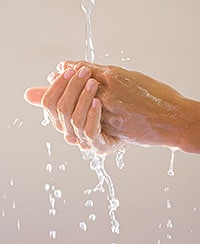Prevention and Treatment
Prevention
Currently, there is no vaccine to protect you against infection caused by human parainfluenza viruses (HPIV). However, researchers are trying to develop vaccines.
You may be able to reduce your risk of HPIV and other respiratory viral infections by taking everyday actions to help stop the spread of germs:
- washing your hands often with soap and water for at least 20 seconds. If soap and water are not available, use an alcohol-based hand rub.
- avoiding touching your eyes, nose, or mouth
- avoiding close contact with people who are sick

Frequent hand washing is especially important in childcare settings. For information about hand washing, see CDC’s Clean Hands Save Lives!
Breastfeeding may protect babies from HPIVs during their first few months of life. That’s because mothers may have antibodies (protective proteins) in their breast milk to fight infection.
If you are sick with a common cold illness or cough that may be caused by HPIV, you can help protect others by
- staying home while you are sick
- avoiding close contact with others
- covering your mouth and nose when you cough or sneeze
- keeping objects and surfaces clean and disinfected
- You may also consider wearing a well-fitted mask. Children ages 2 years and older can wear masks or respirators to protect themselves and others from HPIVs.
Treatment
There is no specific antiviral treatment for HPIV illness. Most people with HPIV illness will recover on their own. However, to relieve symptoms, you can
- take acetaminophen, ibuprofen, and other over-the-counter medications for pain and fever (Caution: Aspirin should not be given to children.)
- use a room humidifier or take a hot shower to help ease a sore throat and cough
People who are sick should
- drink plenty of liquids
- stay home and rest
Antibiotics are not effective against HPIVs. Antibiotics are only effective against bacteria. For information about safe antibiotic use, see Get Smart: Know When Antibiotics Work.
If you are concerned about you or your child’s symptoms, you should contact your healthcare provider.